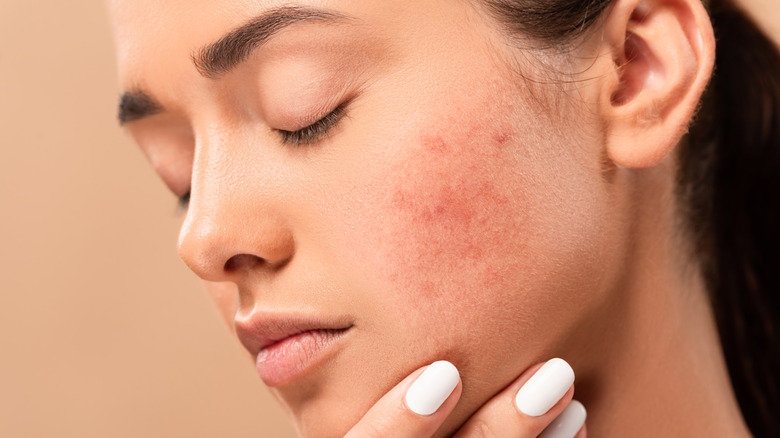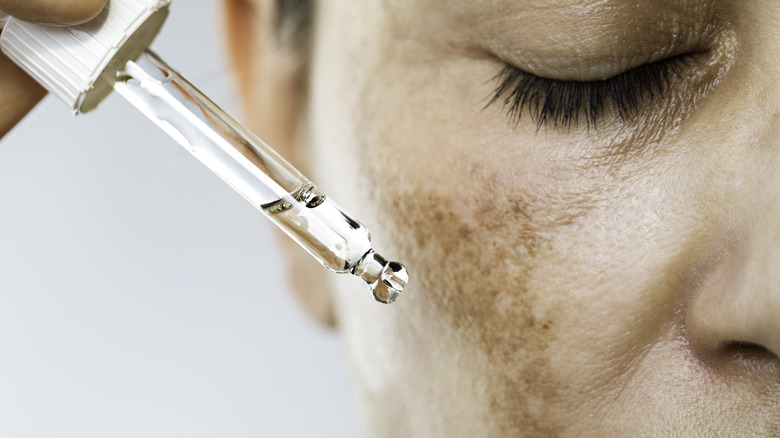Does Castor Oil Help Skin Discoloration?
During your morning routine, you notice a little dark spot near your eye and cheek. While it's tempting to spend a bunch of money on expensive creams to treat your blemish, your best solution may actually not be at the beauty counter, but the grocery aisle: castor oil.
Castor oil has been around as a medicinal oil for centuries, serving as a common additive in food products and other natural medicines. The yellow oil is extracted from the Ricinus communic plant found in Africa and India, and applying it topically to your skin or hair is a perfect way to moisturize and promote wound healing. This age-old remedy can also be taken by mouth to help with gut issues.
In recent years, however, with the increasing demand for clean beauty products, people have begun turning to plant-based oils like castor to deal with their skincare woes. Across social media, natural skincare fans swear that castor oil can help treat discoloration from inflammation, acne, and even reduce over-pigmentation. But is there any truth to the claims? Let's dive in.
Castor oil can reduce the appearance of spots, but it may not be suitable for all skin types
Castor oil is a humectant that aids in trapping moisture on the skin, which is why it works great for improving moisture. Facialist Chelsee Lewis weighed in to Glamour, saying, it's "good for nourishing and hydrating dry, ageing skin." The odorless oil is also rich in omega fatty acids, which help plump and smooth the skin. But the reason it gets touted for its anti-discoloration benefits is because it contains ricinoleic acid, which may help to lighten the skin's pigment. The antioxidants found in castor oil can also help remove free radicals that might be causing hyperpigmentation.
According to the National Library of Medicine, castor oil also contains both anti-inflammatory and antibacterial properties. For this reason, many believe it to be effective at fighting blemishes, skincare founder Susanne Kaufmann told Glamour. The reduction of inflammation works to remove redness and even out our skin tone, which can help minimize the appearance of the discoloration. However, while many experts agree that the natural oil is safe to use for treating hyperpigmentation, others warn that it may not be as effective or beneficial for those with acne-prone skin. Speaking to Byrdie, dermatologist Dr. Morgan Rabach, explained, " I would not recommend [castor oil] for people with acne-prone skin, because oils go into the pores and clog them, exacerbating acne." He continued, "There are some reports that it may have some anti-inflammatory properties, although it has not been well tested or established."
How to add castor oil to your routine
To incorporate the natural oil into your skin regiment, it's important to consider your skin type. Those with dry skin may be able to massage a teaspoon of straight up castor oil into their face using circular motions with fingertips or a jade roller a few times a week. Others with oily or sensitive skin may need to use it less frequently to avoid potential irritation.
In any case, it's essential to allow the oil to absorb into your skin for several minutes before following up with a cleanser to reap the skin benefits. In fact, some dermatologists recommend mixing castor oil with another plant-based oil to aid with absorbency. You can also tap into castor oil's moisture-locking benefits by placing it on top of your nighttime moisturizer. This practice best works in evening as it will make your face appear super oily.
Others may consider taking castor oil in supplement form to target inflammation caused by pregnancy. Although topical castor oil is relatively safe to use, individuals who are pregnant should speak with a doctor or dermatologist before adding castor oil or any other new product into their routine.


